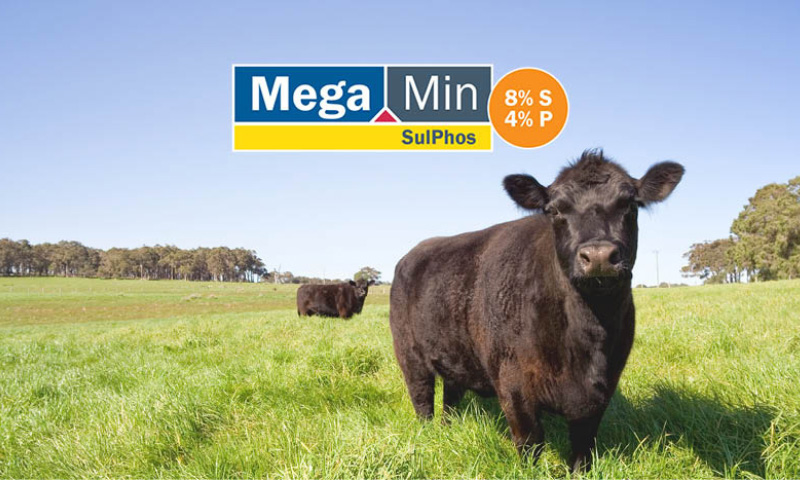Receiving a balanced diet is critical for all animals (including humans) in order to achieve optimum health, fertility, production and being able to perform to the very best of their genetic material. A balanced diet means that all requirements are being met and are in the correct proportions for energy, protein, fat, minerals, vitamins, water and I’m also going to include fibre in this.
An adequate intake of minerals is critical for livestock, either through pasture consumption or supplementation. Unfortunately, pasture is often lacking sufficient amounts of key minerals to meet animal requirements on its own and this is where mineral supplementation is necessary. The role of supplementation is to bridge the gap between what the pasture provides and what the animal actually requires (animal requirements will vary depending on the animal and stage of growth/lactation).
Supplementation should always be focused on the most limiting nutrients. When pastures and forages are dry or frosted then energy and protein are the most limiting nutrients and higher intake protein supplements should be used. When there is a good body of green feed available this is the best time to focus on important key minerals such as phosphorus (P), sulphur (S) and magnesium (Mg).
Providing livestock with adequate phosphorus to meet requirements (especially in P deficient country) is one of the most important things you can do towards improving production in your herd. The MLA (2012) showed that adequate P levels resulted in steers gaining 125kg more than steers with a P deficient diet. Further interim results by Schatz (2018) from a trial being conducted at the Victoria River Research station has reported that heifers supplemented with P were heavier at the end of the first mating as two-year olds. They had a 10% higher pregnancy rate, had a 25% higher re-conception rate, produced calves that were 34kg heavier at weaning, weaned more calves and had a 7% lower mortality rate. With results like this it goes without saying that if you have stock grazing P deficient country (below 8ppm Colwell P) there can be immense production benefits to supplementing with P.
Along with phosphorus there are a lot of Australian soils that are significantly low in sulphur. Underwood and Suttle (1999) explain that feed intake can be influenced directly by the presence of sulphur in the diet, because the synthesis of sulphur-containing amino acids is essential for the maximum microbial growth and, consequently, dry matter digestibility. The sulphur requirements are different between animal species and sheep especially have a high requirement for the mineral as wool contains around 4% sulphur. Because of the additional need of sulphur for the synthesis of wool, sheep have a higher requirement per kg of body weight than that of cattle.
Significant production benefits can be achieved by providing stock with supplementary sulphur in times of green feed and transitioning seasons. Sulphur supplementation can be particularly beneficial when stock are grazing rapidly growing grasses, cereals on sandy or acid soils, forage sorghum and sudan grasses. One of the key functions of sulphur is being an important detoxifier that helps the body to get rid of prussic acid (high levels of prussic acid have been detected in sorghum this year). Like research done into P supplementation, science has proven that liveweight gains can be obtained with S supplementation. A trial by the NSW DPI and CSIRO showed an increase in daily weight gain in cattle supplemented with sulphur and salt compared to the un-supplemented animals.
Another way that sulphur can assist production is by helping in the control of external parasites. External parasites can adversely affect productivity by causing a reduction in weight gain due to the discomfort the animal experiences with high infestations and pests can damage the hide which further impacts on income. Cattle ticks and buffalo fly thrive in the warm, humid conditions, after rain and supplementing livestock with additional dietary sulphur can aid in helping to reduce the parasite burden of livestock. Villar (2006) reported a substantial increase in the level of natural resistance to ticks for cattle fed additional sulphur.
AgSolutions have developed MegaMin SulPhos to provide livestock with a professionally balanced product that helps meet the needs of stock that are grazing phosphorus and sulphur deficient country or have greater requirements for these minerals. As is the case with all supplements, intake is very important, and this is why we also have a MegaMin SulPhos – Sweet blend available. MegaMin SulPhos also provides livestock with the benefits of a full range of macro and trace minerals to help rectify deficiencies before stock head into the situation when they are grazing poor quality pasture.
So, if you have green grass, low phosphorus soils and external parasite are around – try MegaMin SulPhos. For more information or to find a stockist, please contact AgSolutions or call Head Office on 1800 81 57 57
By Shannon Godwin (BAppSc GDTL)
